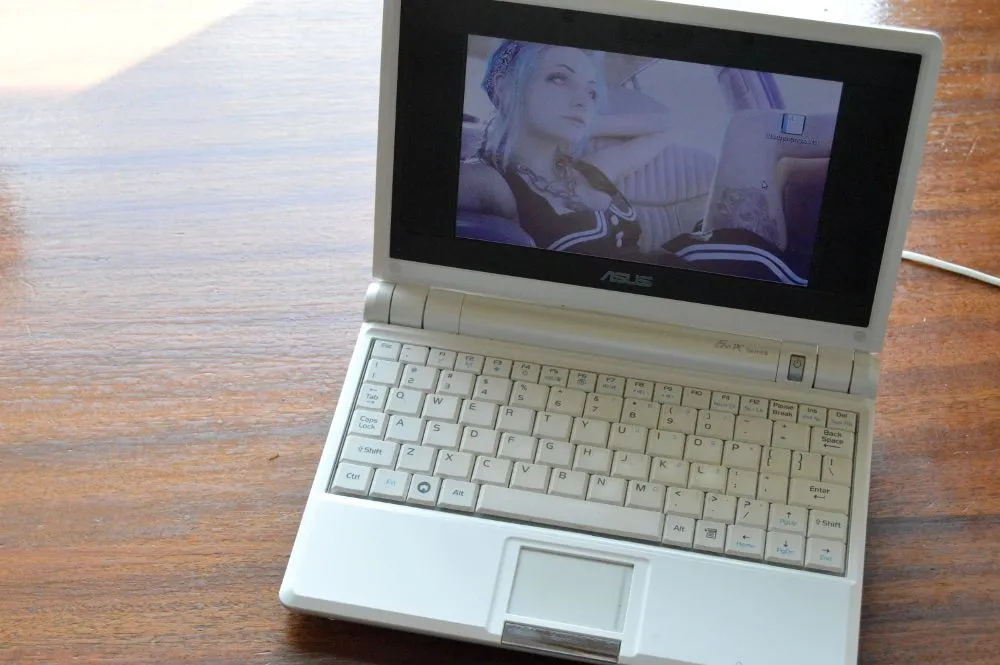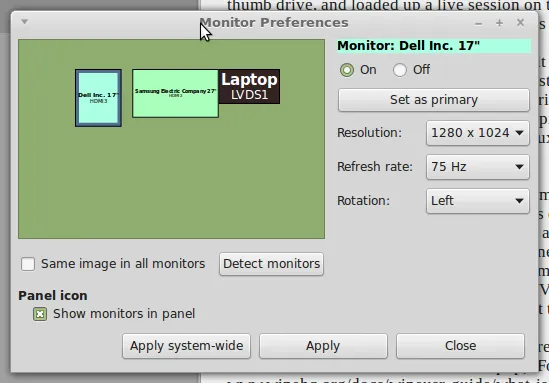Are we using our computers, or are they using us?

The little computer that gave me the courage to try Linux in 2007. Still runs like a champ.
My Wife got me this brave little number as a Christmas present back in 2007. It was the original "netbook," the Asus Eee 701. It came loaded with a version of Linux known as Xandros.
Well, Xandros turned out to be a pretty buggy and awkward distribution. Because of it's limitations, it encouraged me to tinker and experiment with the command line, following along with tutorials to use the enter commands and alter text files until I had a proper desktop environment. After that, I got hooked on trying out different distributions of Linux entirely. (How niave I was in those days, cutting and pasting sudo commands from tutorials with no idea what they meant.) Eventually I installed Xubuntu on that little thing and turned it into a decent workhorse for writing on the go. It's running Linux Mint now, and still works just fine if treated with a little patience.
I've gone hot and cold about Linux over the years. Microsoft was offering Vista back then, an OS so buggy and inefficient I actually paid a buddy of mine $100 to downgrade our new desktop to Windows XP. (He had a spare license.) The wife needed M$ to run Photoshop and handle the blogging software she was familiar with, but I was so enamored of the freedom Linux gave me that I installed it a separate partition. When Windows 7 came along, it "just worked" in a way nothing had before, and I switched back to that because it felt elegant and simple. Windows 8 brought its bewildering "Metro" interface and introduced an ap-store with thousands of half-baked applications. It could still run games and manage a graphics card properly, but I didn't like the feeling that I was being advertized to at the level of the operating system, so I compromised by using different computers for different purposes.
Then I bought a used Thinkpad from eBay, and it came loaded with Windows 10. Windows 10 convinced me that Linux and open source software has to be the way forward, at least for productive creative work.

Pay no attention to the mess of wires. Believe it or not, I got that docking station for free at the dump!
Windows 10 is constantly connecting back to Microsoft's servers to share information, download updates, and reconfigure your computer. Enough has already been written about the privacy violations this implies. Their "Terms of Service" give M$ the right to record your voice and keystrokes, for Chrissakes!
I figured that I'd try it out for a while anyway, though. Maybe it was just the awareness that the Microsoft licence cost something and I might as well get some value out of it. If it was sharing my keystrokes, well...it wasn't like I had anything to hide. (More on this specious reasoning in another post.) And the Windows 10 desktop actually looked nice, going back to the simplicity of 7, for the most part.
It turned out I was just too uptight and distractible to stick with it. What would happen was this: I'd be working on a document in Notepad - just about the smallest program you can run in Windows. Suddenly my fingers would get hot and the fan would start wheezing and blowing out hot air like a hair-drier. Everything on the system would start to lag. I know it's a five year old computer, but c'mon. It was working fine a moment before and I wasn't asking much of it. Did it have a virus? What processes were running? Then it was off to the task manager and google to try to puzzle out what was happening. Maybe it was sending my data off to M$. Maybe it was running "Windows Defender," the built-in anti-virus "solution" that slows the computer down more than a virus would. Maybe it was downloading updates to install later. (And how many times have I shut the thing down only to be told I had to wait fifteen minutes for it to install the latest round.)
I made a game of turning the computer on and letting it idle while I did something else - like read a book or write with pen and paper. Within half an hour I'd hear it gearing up. It would wheeze for a while and then quiet down - always according to its own schedule. If I had an external drive attached to it, that would spin up and gurgle away too.
"Oh hai, Bill," I'd say, convinced that Mr. Gates was checking in on me.
On a newer, more powerful computer I probably wouldn't have noticed these intrustions. But on this one it just got to be too distracting. I was also worried about frying my CPU with all that excess activity.
When ads for programs and services started popping up right on the start menu, I'd had enough. I downloaded a Linux Mint ISO, used Pen Drive Linux to get that on a thumb drive, and loaded up a live session on the Thinkpad. Once I discovered that it worked mostly fine, I wiped the drive and installed for good. (Yes Virginia, I backed up my files to an external drive first.)
Now the fan only starts up when I'm asking it to do some heavy lifting - like opening 15 tabs at once to keep up with my friends on Steemit. Interestingly, it runs about 20 degrees C cooler overall. According to Speccy, Windows was averaging 70 degrees and throttling down at 99 on a regular basis. Linux Mint keeps the CPU in the mid 50s, even on a hot August day.

I love these little terminal programs. watch -d sensors will give you a readout of your CPU temperature.
All of my work here on Steemit (almost two months' worth) has been done on Linux, and I haven't missed any Windows functionality, yet. Sure, a few things don't work. This Thinkpad has a beautiful integrated Wacom tablet and Stylus, but when I spin the screen around into tablet mode, the input no longer matches the rotation. The built in webcam and microphone don't respond any more, but since I've covered over the lens with electrical tape it's not like I'm going to miss that. And no one's written a proper Linux driver for the photo and negative scanner I use (an Epson V550), so when I want to scan slides - or send a scanned paper document to my attorney - I've got to hook it to the Windows laptop my wife and I share.
The only piece of Windows software I used regularly was the writing program Scrivener. Fortunately I was able to use WINE to run Scrivener under Linux. WINE is a compatability layer that allows Linux to run Windows programs it wouldn't otherwise understand. The results aren't necessarily pretty - fonts look blocky and menus load slow - but I've invested too much work and time into Scrivener to give it up. As of now, it's the only Windows program that I can't live without, and for which I can't find a strictly open-source alternative. (I used to love Evernote, too, but they lost me when they demanded a subscription fee to share to more than two devices. That's when I started taking a close look at what closed-source applications I was using and how much data I was trusting to them.)
Linux demands a lot of fussing and tinkering. Less than it used to, maybe, but enough that I occasionally bump into interruptions in my work-flow. Yesterday it gave me trouble because it wouldn't grant "permissions" for me to access files on a thumb drive. I spent about an hour trying to get access before I gave up, copied to files to another drive, and reformatted the new one to a Linux file system. When you're in the mood, challenges like this can be satisfying to overcome. When you're just trying to process a bunch of images and get some work done, it's a drag.
The multi-monitor setup is a bit picky, too. Try as I might I can't get the two screens to react as if they're directly next to each other, so there's a bit of gap and hesitation dragging a window from one screen to the next.

Multi-monitor shenanigans. Can't get the two on the left to "touch".
Watching video produces unsightly screen-tearing, especially if there's a lot of action on screen. Try as I might with different window managers and configurations, I can't overcome this. But that's okay. I'm not really using this computer to watch movies anyway.
I'm sticking with Linux for the time being because it's doing the work I'm asking it to do. When something goes wrong, I can usually fix it myself - or find someone online who knows how to fix it.
There's a lot of really cool stuff I can only do on Linux, too - like connecting to networked drives right from within the file browser. I'll share more of my positive Linux experiences in future posts.
There's surprisingly little written about Linux here on Steemit. I would have thought it was much more prevalent in a crypto-heavy community like this one. What do you think? What OS are you writing from - PC, Mac, or Linux? Do you switch around or have you been committed to your OS for a long time?